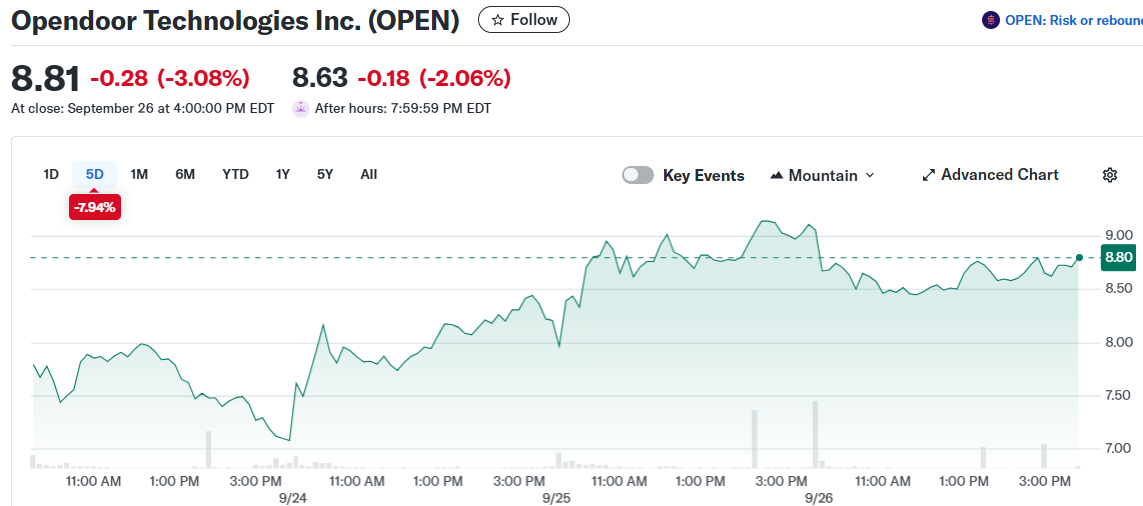TLDR
- Jane Street disclosed a 5.9% passive stake in Opendoor Technologies worth approximately $362 million
- The investment firm owns around 44 million shares but won’t pursue activist strategies
- Opendoor stock jumped over 10% following the disclosure news
- The position could be a direct investment or hedge against another trade
- Opendoor has gained 450% year-to-date driven by meme stock activity
Opendoor Technologies shares climbed more than 10% after quantitative trading giant Jane Street disclosed a substantial passive stake in the online real estate platform. The move sent the volatile stock higher for the second consecutive day.

Jane Street revealed a 5.9% stake in Opendoor through a Securities and Exchange Commission filing. The position consists of approximately 44 million shares valued at roughly $362 million based on recent closing prices.
The disclosure put Opendoor back in the spotlight after months of wild price swings. Shares finished the Thursday session up 10.3% as investors processed the institutional interest.
Day 38 — Live from the streets of Frankfurt 🇩🇪 Just off a redeye, straight into DeFi Tech conference. No sleep, big ideas. Meanwhile $OPEN staged a massive turnaround yesterday… where are all the crybabies now? 🚀 pic.twitter.com/sL12LCyAzh
— Eric Jackson (@ericjackson) September 25, 2025
Jane Street operates as one of Wall Street’s most profitable quantitative trading firms. The company generated $10 billion in net trading revenues last year through sophisticated high-frequency trading systems.
The firm is also a major market maker in global financial markets. This dual role makes the nature of its Opendoor investment unclear to outside observers.
Jane Street filed the stake as a passive investment under SEC rules. This means the firm won’t push for activist strategies like forcing a sale or demanding board representation.
Investment or Hedge Position?
The true purpose behind Jane Street’s position remains a mystery. As a market maker, the firm could be using the shares to hedge against other trades rather than betting on Opendoor’s future.
The trading giant might be protecting itself against call options it sold to other investors. This hedging strategy would explain the passive filing status and large position size.
Alternatively, Jane Street’s quantitative models may have identified value in the beaten-down real estate stock. The firm’s algorithms scan markets constantly for pricing inefficiencies.
The investment does put Opendoor on institutional radars after being driven primarily by retail traders. This marks a shift in the stock’s investor base composition.
Opendoor has gained 450% year-to-date as meme stock enthusiasm returned to markets. The rally began in July when retail investors started piling into shares.
The stock received another boost earlier this month with leadership changes. Former Shopify COO Kaz Nejatian joined as CEO while company founders returned to the board.
Analyst Skepticism Remains Strong
Wall Street analysts maintain a bearish outlook despite the recent price surge. Four of six analysts tracked by Visible Alpha rate the stock as a “sell” with two “hold” ratings.
The mean analyst price target sits at $1.02 compared to current trading levels around $8-9. This represents a massive disconnect between professional forecasts and market pricing.
Opendoor’s business model involves buying homes directly from sellers and reselling them after improvements. The company has struggled with profitability as it scales operations across markets.
Like other meme stocks, Opendoor attracts heavy short interest from hedge funds. The company remains unprofitable despite its recent stock price gains.
The stock trades with dramatic daily price swings that can reach double-digit percentages. This volatility reflects the ongoing battle between retail investors and short sellers.
Jane Street’s disclosure adds another layer to Opendoor’s complex trading dynamics. The firm’s involvement could signal broader institutional interest despite analyst skepticism.
However, given Jane Street’s trading-focused business model, the position may serve purely tactical purposes. The firm regularly takes large positions across thousands of securities for various strategies.
Opendoor continues navigating its transformation under new leadership as CEO Nejatian brings experience from scaling Shopify’s operations.








